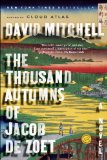Page 1 of 1
There are currently 3 reader reviews for The Thousand Autumns of Jacob de Zoet
Write your own review!
 Cloggie Downunder
a brilliant read
Cloggie Downunder
a brilliant read
The Thousand Autumns of Jacob de Zoet is the fifth novel by award-winning British author, David Mitchell, who classifies it as historical fiction. Jacob de Zoet is a young Dutch clerk, a Zeelander working for the Dutch East India Company, on a five-year clerical post to Java, where he hopes to make his fortune in order to marry his Dutch sweetheart. He arrives in Nagasaki with the new Chief Resident-elect of Dejima, an island enclave to which the Dutch traders are confined. Soon after his arrival, he encounters a young Japanese midwife with whom he promptly falls in love. Mitchell slowly and carefully crafts his plot to reach a dramatic climax. Mitchell’s potted histories of his characters contribute to their depth and appeal, as well as developing the plot. His dialogue sounds genuine, especially the rendering of translated language. Mitchell gives the reader a fascinating peek into the world that was European trade with Japan in the late 18th century. This was a world filled with corruption, bribery, execution and religious persecution. De Zoet learns the diplomacy and the political tactics necessary in dealing with the Japanese, and that men of honour and integrity are few and far between. This novel makes the historical facts, which might have been dry and unpalatable, interesting and easy to assimilate. De Zoet is loosely based on Hendrick Doeff, one of Dejima’s real Chief Residents. Mitchell does bend a few historical facts: the incident on which the climax is based actually happened somewhat later; the reference by characters in 1799 to the mass eradication of Tasmanian aborigines is premature; nonetheless, this does not detract from the novel in any way. Some of the prose is truly beautiful: Mitchell manages to be quite lyrical about clouds and weather; there are also several charming illustrations. This is a brilliant novel and easily the best I have read in a long time.
Valerie
A well-written, captivating work of historical fiction
I had a hard time settling into this book, with some of the flowery language turning me off at first. ("...a cacophony of frogs detonates?" Really?) But I kept at it, and I ended up really enjoying the story, at least for the most part.
Jumping right into a Dutch trading settlement on the edge of Japan, the book mostly focuses on Jacob De Zoet, a clerk brought in to sort out corruption in the books. From his perspective, we learn about a time in history I wasn't fully aware of, and it's all quite well-researched to make it seem quite realistic.
The perspective does change from time to time, following some of the secondary characters. Unfortunately, some of this includes jumping back and forth in time, which was a bit disorienting. It took some work to follow the dates and realize the time jumps, which was a bit tedious.
Additionally, there was an awful lot of story-telling by the characters, which fits with the environment but was a little tiresome as well. I wanted to be shown things, not just told about them. The story kept up at a really good pace for most of the book, though towards the end it sort of coasted along towards the end.
Overall though, I would recommend this book, though it is a lengthy read and takes a bit of work to get through. I enjoyed it enough to pursue some of Mitchell's earlier books, which I'd only heard bits about.
chetyarbrough.com
Historical Fiction
This book misses the mark of great story telling because David Mitchell fails to develop characters or a theme that sparks enduring interest and memory. Mitchell breaks no new ground in this historical fiction. The story of Japan’s isolation and singular culture is better told by Clavell in “Shogun”. Clavell’s hero, though equally formulaic, successfully cracks the harsh Japanese culture in a more emotive and entertaining story.
